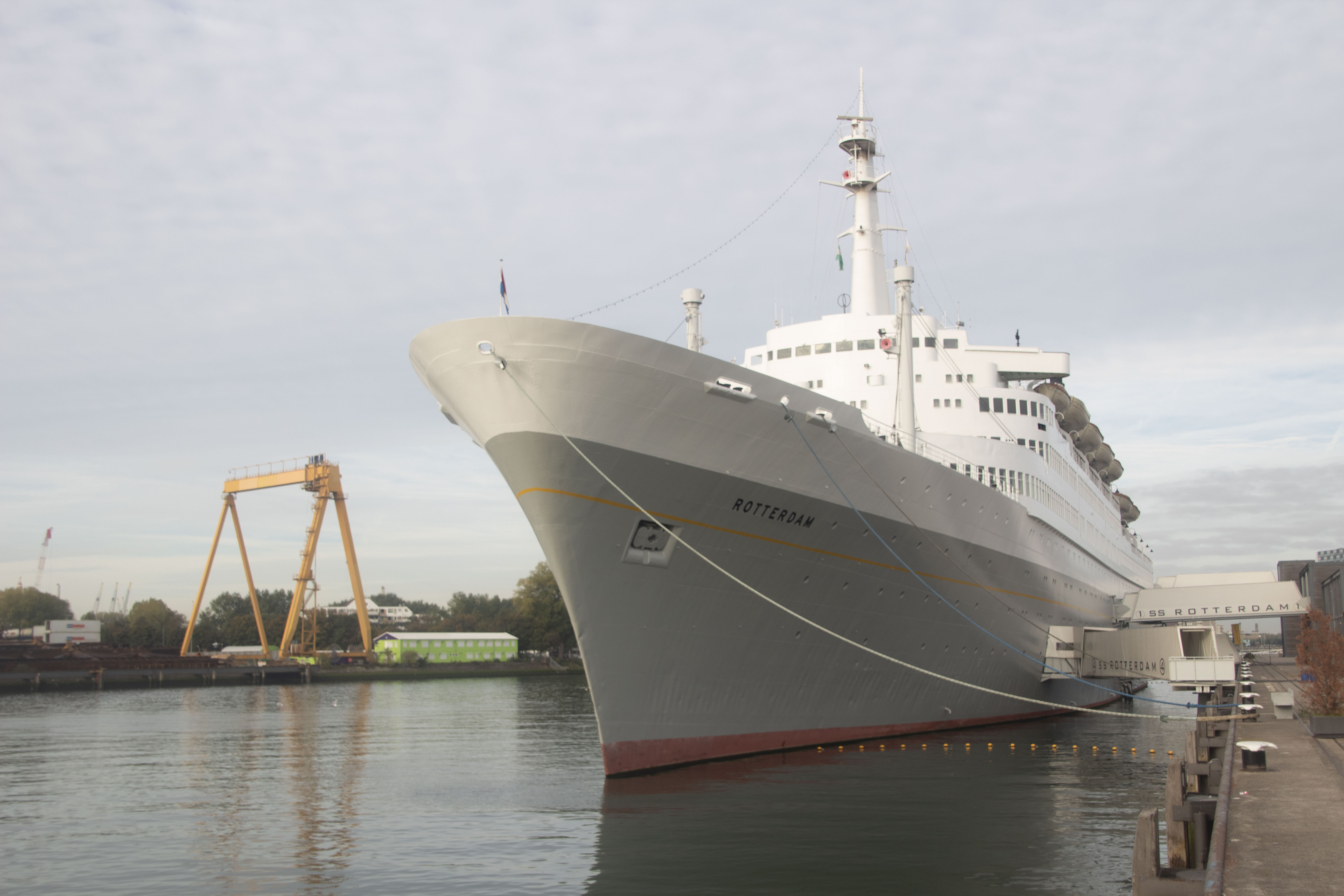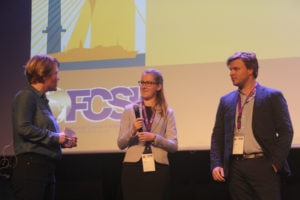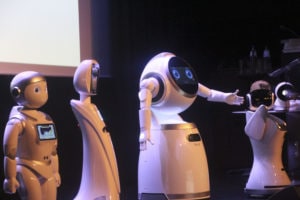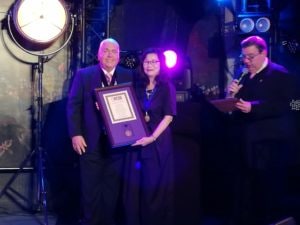
The central theme of the 2018 Conference for FCSI Europe, Middle East & Africa (EAME), held in Rotterdam, Netherlands, between 18-20 October, was ‘The future of food and hospitality’.
It was no surprise, therefore, that futuristic hospitality concepts and expert predictions as to how the industry will need to react to changes on the horizon loomed large throughout the conference programme.
Another continous thread was how professional members of FCSI and Allied member manufacturers are coping with present-day challanges.
 The Conference took place aboard the impressive SS Rotterdam, a former flagship cruiseliner of the Holland-America Line.
The Conference took place aboard the impressive SS Rotterdam, a former flagship cruiseliner of the Holland-America Line.
The ship was converted into a moored hotel and conference centre with 254 four-star hotel rooms, in which the décor is true to the style of the 1950s when the ship was built.
FCSI professional member Gerben van der Molen FCSI of Stars Design worked on the design of the hotel for a number of years, commencing work on the project in 2006.
A bright future
Conference host Remko van der Graaff, chair of FCSI EAME, kicked off the event at a party on the evening of Thursday 17 October with a speech to the approximately 280 attendees, which included many professional members from FCSI Asia Pacific and The Americas, thanking sponsors who had made the Conference possible.
Four Globes sponsors included Electrolux, Hobart, Meiko, MKN and Rational. Three Globe sponsors were Ideal AKE, Ansul, Moduline, Welbilt, and Winterhalter and Three Globe sponsors were Ambach, Bertos, Comenda, Dieta, Eloma, Fagor, Halton, Insinkerator, Josper, KCL, Modular and Unox.
The pre-conference party also saw pro fessional member Jürg Luginbühl FCSI launch a ‘Student’s challenge’.
fessional member Jürg Luginbühl FCSI launch a ‘Student’s challenge’.
The task was set for nine young hospitality professionals from across European catering and hotel schools to establish and present a business plan for a food and hospitality concept fit for purpose in 2045.
The students were split into two teams, Team Yellow and Team Orange, and given 24 hours to formulate their plans, before having to present their respective concepts to a board of judges (Mario Sequeira FCSI, William Caruso FFCSI, Paul Montegut FCSI, Julian Edwards FCSI and Milan Milanovic FCSI) at the close of the conference.
The future of food
Van der Graaf appeared again on stage on the morning of the first day of the Conference, first as a hologram and secondly via a BEAMPro telepresence robot to introduce the conference programme and to welcome the hosts/moderators, Tina Nielsen and Michael Jones.
The first speaker was Richard Kuijpers, owner of smartrobot.solutions, who addressed how robotics and automation are poised to become inceasingly influential in foodservice and hospitality in the future. Kuijpers was a fitting speaker, bearing in mind the Netherlands is the world’s second largest manufacturer of robots, following Japan.
 According to Kuijpers, robots will take over a number of roles in the hospitality profession in the future, but primarily these are labour-intensive positions that humans are unlikely to want to fulfil in future generations. Kuijpers conceded that robots, while incredibly useful, cannot ever fully replace the human element of hospitality, but simply support it.
According to Kuijpers, robots will take over a number of roles in the hospitality profession in the future, but primarily these are labour-intensive positions that humans are unlikely to want to fulfil in future generations. Kuijpers conceded that robots, while incredibly useful, cannot ever fully replace the human element of hospitality, but simply support it.
Tasting nature
Kuijpers was followed on stage by Michelin-starred chef Theodor Falser, chef de cuisine at the Johannesstube restaurant at Engel Gourmet & Spa in South Tyrol, Italy. A passionate speaker, Falser advocated that the future of hospitality, and certainly the ‘Taste nature’ concept he lives and breathes at Johannesstube, should be about getting back in touch with nature by using increasingly local ingredients and building lasting relationships and partnerships with local suppliers.
A speed-networking session between attendeees during lunch was followed by a series of ‘Masterclasses’, chaired by experts addressing a wide plethora of hospitality topics including social media, working with Millennials, sustainibility, 3D-printing and Hazard analysis and critical control points (HACCP) in foodservice. A General Meeting for FCSI EAME followed in the afternoon, before a ‘Dutch evening’ at Restaurant Zalmhuis in The Hague.
Day two
The second day of the Conference saw professor Fritz-Gerald Schröder, professor for Horticulture Sciences at the University of Applied Science Dresden, Germany, address the subject of ‘How to feed the world in the future?’ Schröder delivered some fascinating insight into the latest trends and an outlook for food production, food quality and life in smart cities.
Stuart Charlton, Tina Nielsen and Michael Jones of Progressive Content also presented on the subject of how members can get the most value out of the FCSI portfolio, which includes the quarterly Foodservice Consultant magazine, the fcsi.org website, a weekly newsletter and magazine app.
A presentation of the two teams for the Student Challenge followed, with Team Orange (pictured above, with Tina Nielsen) being awarded the judges prize, for what they described as a “hugely accomplished and well thought-through” concept.
The final keynote address at the Conference was given by the inspirational Niek van den Adel, author of Crash! His speech, titled ‘Some people need a brush with dead to start living’, described how a motorbike accident in 2010 left the Dutchman paraplegic and wheelchair bound. The heartwarming element of van den Adel’s story is he firmly believes the accident changed his life for the better, not worse. It proved to be an emotional and life-affirming way to close the programme elemement of the conference.
Inspirational
Four ‘inspiration tours’ of Rotterdam, themed around Rotterdam Harbour, History, an alternative food perspective of Rotterdam and architecture, took up the afternoon of the final day of the Conference.
An evening dinner party in SS Rotterdam’s Grand Ballroom saw professional member Bjorn Grimm FCSI given a special award for his services to management consultancy and to the FCSI Germany Austria division.
The party also saw Clara Ming Pi FFCSI being inducted into the FCSI Council of Fellows by William Caruso FFCSI (PP), chair of FCSI The Americas, and Martin Rahmann FCSI, chair of FCSI Worldwide (pictured below).
Pi’s commitment to sustainibility has been a constant for FCSI since she joined its Worldwide Board in 2005, ensuring the 2008 FCSI conference in Beijing, China was carbon neutral.
Since that first carbon neutral conference in 2008, Pi has been pioneering efforts to make FCSI conferences carbon neutral. Every year, FCSI donates hundreds of trees to be planted in Inner Mongolia to offset the carbon footprint, and over a decade thousands have been planted, most of which Pi has supervised.
The success of each FCSI conference has always been its ability to marry together its history and experience, present-day challenges being experienced by members and the future. The FCSI EAME 2018 Conference in Rotterdam was no exception. And a lot of fun too.
Michael Jones
Pictures: Fabienne van der Graaff, Tina Nielsen

